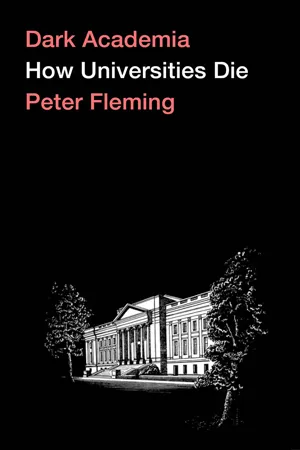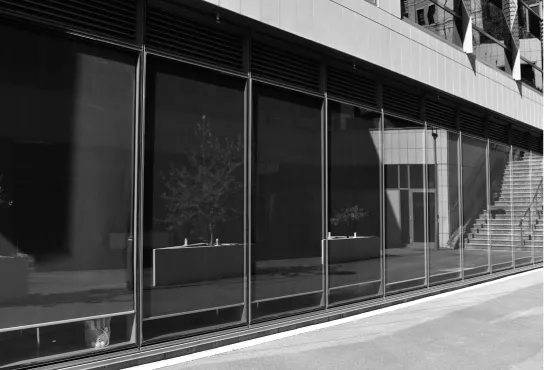![]()
1
Dark Academia
1.
Snow was falling hard in London and the streets were treacherous. Upon leaving my apartment that morning I wondered whether the inner city demo might be called off. Luckily it wasn’t. I met up with some colleagues at a pub and then joined the thousands of university workers on strike. The 2018 UK pensions’ dispute had been smouldering for a while. Employers were stubbornly sticking to their plans to eviscerate our pension scheme. As the march began – winding its way through the frozen city towards Parliament Square – war stories were shared among friends and strangers. Some HR departments had upped the ante, claiming teachers could be personally liable for missed classes if students demanded a refund. Coventry University established a private subsidiary – Coventry University Group – with its own company union or Staff Consultative Group. They effectively barred the national union from representing its lecturers.1 Ugly terms and conditions followed. Reports of other underhanded tactics were shared among the crowd as we huddled together and rubbed our hands for warmth.
A number of things occurred to me that day. The strike had revealed some unpleasant truths. Call me naive, but up until then I hadn’t really seen the university as a stereotypical ‘employer’ who stood over its workers shaking a stick. Packing shelves in supermarkets as a teenager, yes. But universities were supposed to be striving towards a very different governance ideal, a community of equals where those at the top of the ladder were simply an elevated version of ‘us’. Not anymore it would seem. All of a sudden the fluffy rhetoric about collegiality evaporated as dark suited bosses and their HR footsoldiers began snarling at us. I’d been wrong to assume that an academic vocation was different to working for Accenture. The kind of occupational solidarity I believed fundamental to the job was completely out of sync with the times.
This misfit between expectations (academic values) and the brave new world of higher education is one reason why universities have become such sad places to work. A recent survey of 6000 UK academics revealed a whopping 90 per cent were ‘very unsatisfied’ with university management.2 Stress, lack of respect, minimal voice and low trust were common reasons why. The problem is that academics are highly trained specialists who’ve dedicated years of painstaking study on their chosen discipline. Nobody in the organisation is more knowledgeable about their teaching and research area, including line-managers. Simple top-down hierarchies don’t work in this setting and generally piss people off. And unlike manual workers who must produce X number of widgets, academic labour is abstract and can’t be prompted by factory-like performance incentives. Yet they pervade the sector with a vengeance.
The pre-neoliberalised university aspired to collegial selfgovernance not because it was ‘nicer’ – often the opposite – but because it was the best way to organise a workforce with these idiosyncratic attributes. The ideology of managerialism radically revoked this idea. Instead of originating from the academic community as elected peers (to which they would eventually return), a detached cadre of managers now circulate within the higher education industry, moving from institution to institution, having little in common with the scholars they oversee.
2.
The militancy displayed by workers during the pensions dispute came out of nowhere and was a major surprise. Like others, I’d partially written off rebellion in the corporate university. Years of economic rationalisation had irrevocably splintered and fragmented the profession. Hence the dark mood of defeatism in academe. Employers had succeeded in transforming higher education into a de facto capitalist industry – an ‘Edu-Factory’ – and resistance was futile.3 But not so fast. After the strikes a modicum of optimism crept back into the workforce, cruel perhaps but unmistakeable. University management eventually backed down and agreed to reconsider their plans for our pensions. Everyone returned to work and it looked like victory for our union. I left England not long after.
About a year later some friends told me that trouble was brewing again. Workers were returning to the picket lines, with pensions again the central grievance. It seemed that the initial management concession was a ploy to defuse the momentum generated by the first strike. They bargained it would be difficult to repeat this after everything had returned to normal. That’s when employers pushed for pension cuts again, only this time with increased belligerence. At Liverpool University, staff were informed they’d have to make up missed classes or face serious penalties. Pay had already been deducted during the strike, so this meant working for nothing. Similar strong-arm tactics were levelled at students too. Those who either joined the strikes or refused to cross picket lines, a letter from the Liverpool University Vice Chancellor warned, ‘will be marked as absent, which will have an effect on [their] attendance record’.4 International students would jeopardise their visas as a consequence.
The British pensions dispute is not a unique case. Industrial action has occurred in other countries as higher education providers seek to squeeze cost-savings from the workforce and ramp up productivity. For instance, US adjuncts languish on terrible pay and conditions. They’ve launched protests at several colleges over the past few years, including Cincinnati, Montclair State, Point Park among others. These promising moments of revolt led some to predict that an ‘adjunct revolt’ might soon be underway.5
But it was a false dawn. No sector-wide movement has emerged to challenge the hyper-exploitation that’s been routinised in US colleges and universities. Even when the profession enjoyed its most powerful opportunity – during the Covid-19 crisis as universities became totally reliant on academic goodwill and unpaid overtime – most unions simply kowtowed and got to work.
This is an important point. Notwithstanding the UK pensions strike, the unhappiness sweeping higher education in the US, UK, Australasia, Canada and many European countries has rarely resulted in effective counter-planning and resistance. Some even talk about academic zombies on this score, which is a bit harsh.6 Nevertheless, the higher education workforce has proven remarkably lousy at translating their frustration into a sustained movement, a conundrum this book will try to explain. Without a unified voice, the despair has been pushed underground instead, a problem for individuals to deal with alone as they bear heavier teaching loads, more emails, deteriorating pay and conditions and the unstoppable march of managerialism.
Sure, we can identify a few isolated and occasional victories. And once again, it’s not as if academics aren’t getting stroppy. Think here of the scolding open letter sent to the UK government by 126 prominent professors in 2015.7 It didn’t change anything. There’s a general sense that the overall war has been lost and higher education is teetering on the brink of something much worse. The 2020 Covid-19 pandemic didn’t alter that view, on the contrary.
While we have a decent understanding of what’s objectively gone wrong in higher education, less attention has been paid to the psychological and emotional toll that 35 years of funding cuts and creeping technocracy has had on staff and students. In exploring this dimension, the book presents a doleful assessment. Moreover, exactly how we might crawl from the wreckage, one that seems fairly complete, is not entirely clear. Hence why the recent wave of optimism that’s appeared on this question is somewhat premature. Several writers contend that we can still salvage the university and its progressive agenda.8 Eminently sensible roadmaps for radical change are then posited. But let’s face it. Try being a ‘slow professor’ today and you’ll soon be on the wrong end of a pink slip. That’s my point: the principles of neoliberalism are now so entrenched that one has to wonder whether the modern university is capable (nay, worth) being saved.
I know the familiar retort. One cannot be critical without proposing alternatives, et cetera. But that’s something I’ll only reluctantly do given the rubble before us. This book is therefore an exercise in uni-pessimism, justified by very real and concrete trends. It is time to ask the old Kantian question of whether hope itself is admissible when it comes to one of our most revered establishments.9 For all intents and purposes, the bad guys have won. And if so, perhaps it’s time to consider beginning again and escape the impenetrable darkness that’s eclipsing the academy today.
3.
Contemporary critics of the neoliberal university face three challenges.
First, the most successful arguments against higher education today – that are actually being listened to and acted upon by power-holders – are not coming from the left. Instead neo-conservatives and libertarian right-wingers are making the biggest ripples in this respect.10 University bashing has become a favourite pastime in these camps. That was evident during the Covid-19 pandemic. Cato Institute analyst, Bryan Caplan, implied the crisis could help expose the systemic failures of higher education in America.11 The same attitude might also explain why governments around the world excluded universities from ‘job keeper’ financial aid as the pandemic spread and staff were fired. Best to let the market work its magic instead and streamline an industry that’s weighed down by thousands of needless ‘bullshit jobs’.
In light of this enmity, any progressive and emancipatory re-evaluation of higher education must carefully sidestep the reactionary right-wing pessimism that’s helped lay waste to tertiary education over the past several decades. One of the staunchest critics of the neoliberal university today remain neoliberals themselves! Even as the sector buckles under the weight of extreme commercialisation, pundits continue to believe that universities need further market reforms to fix this now highly dysfunctional industry. That marketisation is a root cause of these dysfunctions is unimportant to them.12
It’s easy to spot libertarians like Ben Shapiro and Bryan Caplan when they start laying into the university with puerile accusations. The situation gets murkier, however, when pro-market theorists deploy left-sounding lamentations about the ‘corporate university’, only to conclude (in the name of pragmatism and ‘you gotta know the territory’) that institutions must adapt and work within these constraints.13
In any case, the political terrain we must traverse isn’t simply divided between those ‘for’ or ‘against’ the corporate university. Matters are more complex.
Second, one cannot ignore the fact that academics themselves have often played the neoliberal game, seduced by competitive careerism and its incentive systems, hoping to come out on top or even famous. Don’t get me wrong, the ‘publish or perish’ directive is very real and limits our options to act otherwise. Faculty are terminated or denied tenure on these grounds. By the same token, however, this is not entirely a story of helpless victims. I’m not just talking about the few career psychopaths prowling the academy, who’d gladly walk over a grandparent if it meant landing a major journal publication. No, I’m referring to the silent majority, reasonable and otherwise self-aware scholars who have, often out of necessity, quietly internalised the new dogma, leaning on it as the default option for how the profession works.
Reversing corporatisation is thus difficult when individual careers are pegged to its key mechanisms, perpetuated even by those who end up angry and frustrated by those mechanisms. For example, I’m still surprised that when I suggest journal rankings ought to be abandoned given how divisive they are, some colleagues remain hesitant: ‘that’s going a bit too far isn’t it – we still need some sort of quality measure don’t we?’ Careers and occupations have been thoroughly tied to the fetish of ‘top-tier’ journals, even among those who feel disadvantaged by the arrangement, which indicates how tough it will be to undo the precepts of academic capitalism.14 But one thing is patently obvious. That singleautho...

